Posted by Deborah Huso on Nov 22, 2017 in
Musings,
Relationships 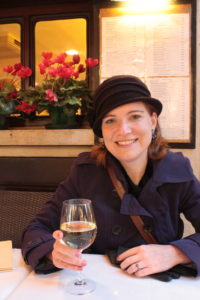
The best Thanksgiving ever…in Venice, Italy.
Okay, so I guess I don’t really hate Norman Rockwell. I mean I really like his beautiful studio location in the Berkshires of Massachusetts…. But Norman Rockwell hasn’t done any favors for the non-traditional American household (not to mention the just plain dysfunctional one), that’s for sure, particularly when it comes to winter holiday celebrations.
I don’t even have to tell you what I’m talking about here—you know the painting—“Freedom From Want”—where Grandma and Grandpa, all the aunts, uncles, children, cousins, you name it are gathered ‘round the table for a traditional Thanksgiving feast.
Is this what your Thanksgiving or Christmas get-together looks like? Be honest. Outside that photo you post on Facebook where you were able to get everyone to smile for all of three seconds….
Is it passé to note that I hate the holidays? In fact, if I didn’t have a 10-year-old, I wouldn’t even acknowledge them. Nothing brings one into greater intimacy with one’s social and familial inadequacies than the holidays. And I have no illusions here. I’m not alone in this feeling, not by a long shot.
A friend of mine said to me a few days ago, “I cannot wait for December 26 to get here.” And this is a woman with the so-called traditional American household—husband, kids, extended family nearby, all of whom gather together for these seemingly mandatory get-togethers where we all pretend we like one another and try to create our own Rockwellian Thanksgiving or Christmas.
Who’s buying this shit? The kids…maybe. No one else is, I’m sure of it.
Some people will jump to the conclusion that I despise the holidays because I’m a divorced single mom and only child. But this really isn’t what’s going on. Being divorced doesn’t make me sad, nor does being an only child. What makes me sad is the societal pronunciation that my life is somehow inadequate because I lack a husband, siblings, a loving mother, grandparents (they are all dead now), and the ability (or desire even) to cook a succulent turkey for a table of 20.
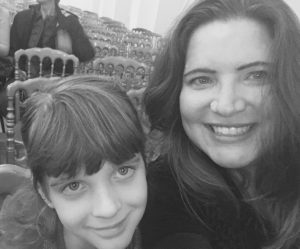
Christmas night with my daughter at an opera house in Vienna, Austria.
What’s even sadder is when I let this societal expectation rule my happiness (or lack thereof) and succumb to enduring a painfully inadequate attempt at replication of the scene in “Freedom From Want.” If you don’t know what I’m talking about, consider yourself unusually lucky. It means you’ve never been party to a Thanksgiving or Christmas feast among family members you see maybe once a year, most of whom you are, at best, indifferent to, and some of whom you downright loathe. It means you’ve never endured the steely stares or awkwardly averted gazes of those relatives involved in decades-long feuds. And it probably also means that you’ve never wanted to stab your spouse with the carving knife instead of the turkey.
Who are you?? I’m sure we are not friends.
Only days ago, I saw a Facebook post from an acquaintance proclaiming that no one in her sphere should be “alone” on Thanksgiving, that any such desolate person was welcome at her table.
Don’t get me wrong. I fully appreciate the spirit behind her entreaty to the introverts and outcasts among us (to name but a few of the folks who know a glass of wine and a book in front of a fire are way more fun than a gathering with strangers or most relatives, for that matter). But wasn’t her post yet another indictment against those of us who do not fit the turkey bill?
I know the last thing I’d want to do on Thanksgiving is trade my comfy couch and a good Netflix binge for a gathering with other people’s dysfunctional relatives!
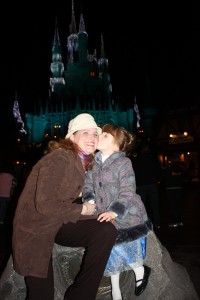
Christmas at Disney World
Frankly, this is why I typically run away from holidays. While all of my social media friends are oohing and aaahing over my photos from Thanksgiving Day in Venice or Christmas night in Vienna, thinking I live the life of the consummate jetsetter and am a woman worthy of envy, I know, no longer secretly, that I’m just running away from home—kind of the way I did as a child when I’d pack up some cookies, a good book, and bring the dog along to retreat for a few hours to some secret spot along the creek on my parents’ farm. I never got as far as Vienna in those days.
But the sentiment was the same: This is bullshit; let’s get out of here and have some fun!
And so, less guiltily the older I get, I frequently escape the traditional dysfunctional sit-in of Rockwellian lore to drink wine recklessly on Thanksgiving Day with a dear friend near the Rialto Bridge or enjoy a Christmas feast with new-found friends and adoptive grandparents for my daughter overlooking the Danube in Austria.
Suddenly the holidays are magical again! All I have done is change the scene, ignored the entreaties of relatives who don’t like me anyway, and absconded to a fairy land where I can make the holidays anything I want…. And no one can enter my fairytale but those I love and who love me back.

One of my best holiday memories: Thanksgiving with my oldest friend and best friend
But lest you think the only way to escape the Rockwell nightmare is to leave the country, let me tell you this isn’t so. One of the best Christmas Days of my life occurred when my daughter and I spent Christmas just the two of us at home, baking Swedish meatballs, opening our gifts together, coloring and painting while sipping hot tea.
I don’t need the Saturday Evening Post-worthy family portrait to make my holidays happy. I don’t even need a turkey or a Christmas tree. What I need, perhaps, is for the societal pity to cease, the assumption that I’m alone to end. I know when I die my bedside will be surrounded, perhaps not all by blood family (after all, I’m an only child), but by the family I have chosen.
This is not a family with whom I necessarily spend the “sacred” holidays, but they are the ones with whom I spend my daily life–my toils, my fears, my joy.
And while I am spiriting across the ocean to find my holiday bliss in far-off lands, my heart lies in the hands of those who know better than to ask if I need a place to park my fork on Thanksgiving. They know I will show up when it counts—on the mundane days and the dark spaces in between the joy. The holidays are of no consequence. One’s real family shows up on the hard days—the ones you won’t find portrayed on that cheery Rockwell calendar.
Posted by Deborah Huso on Feb 16, 2017 in
Musings,
Relationships,
Success Guide “If you’re really a mean person, you’re going to come back as a fly and eat poop.” –Kurt Cobain
You don’t have to be a Buddhist to respect and appreciate the law of karma. It’s kind of like confronting an armed man in a dark alley and saying, “No, I’m not going to give you my wallet in exchange for my life.” Reasonable people just don’t mess with that shit.
Unfortunately, it appears there are more than a few less than reasonable sorts out there who are willing to sacrifice their lives (or at least the quality of their lives) for the sake of hanging onto that wallet.
History and popular culture are filled with folks who didn’t believe the karma bus would ever come calling—think Kenneth Lay or Jeffrey Skilling. Or larger karmic outcomes like the rise of ISIS in the wake of Western powers abandoning wars they initiated and leaving shaky and corrupt “democratic” governments to handle the fallout.
Karma is basically the philosophical cousin to Newton’s third law of physics, which states that for every action, there is an equal and opposite reaction.
Be a distant, critical, and unloving parent–be prepared for your children to hate you and abandon you in old age. Treat your co-workers with repeated disdain and backstabbing–don’t expect anyone to come to your defense when lay-offs start.
But here’s the thing about karma: It can be slow, and it’s not always obvious. Which might just be why so many people think they can escape its clutches and why so many of the rest of us rail against the karma bus’s failure to arrive at what we feel is its designated stop.
The Dalai Lama advises, “When you have made a mistake, take immediate steps to correct it.” The idea here is that you can fend off bad karma from a bad action by making things right again. But don’t suppose you can make things right by working in a soup kitchen after cheating on your spouse or donating money to a charitable cause after blindsiding your business partner. “Non sequitur,” as we journalists like to say.
In other words, you’re still going to hell…or at least purgatory.
You’re still going to die alone of terminal cancer with no friends or family who really care all that much because you’ve alienated them all, failed to nurture your relationships, or maybe never chose real relationships to begin with.
And maybe all the people you hurt, abandoned, or took advantage of are dead or senile by then, and maybe you’re senile, too, but who wants his legacy to be heart attack after indictment for a massive Ponzi scheme or slow death among indifferent strangers who have to be paid to change your diapers?
I had a great aunt who died in her mid-90s after many years as a widow. While some of her age and generation wailed about grandchildren who didn’t visit them, she was taking pictures with a digital camera at her great-granddaughter’s volleyball games, chatting via email with her children, and reserving vacations with other adventurous strangers on long bus trips to national parks.
“Happiness is not something ready-made,” the Dalai Lama tells us. “It comes from your own actions.” My great aunt probably didn’t think much about karma, but she lived as if she did….
So how do you ensure you’re not sitting on a stinky cow eating poop in your next life? Or maybe even in this one?
Here are some tips….
- Stop fulfilling your own negative prophecies. Let go of the past. It’s only an informer of the future if you let it be.
- Do something different. So you think life is meaningless and sad? It’s probably because your existence is like the movie Groundhog Day. Go for a hike. Take a class. Ask someone in the grocery store line out for coffee.
- Build real relationships, and then nurture them. Love people for who they are, not what they can do for you.
- Dump toxic hangers-on. If your friends only come calling when they need something and frequently fail to show up for you unless you’re buying the drinks, shed them. No friends left after that? Refer to no. 3….
- Practice gratitude. Be thankful for the good things in your life. And remember to thank the good people who look out for you.
- Be vulnerable. Smile at strangers. Tell a friend your most secret fear. Admit it when you’re in error.
- Stop taking offense. Try not honking and cursing at the driver who cut you off in traffic for starters. And if you feel criticized by a friend, look for the loving intention before you lose your temper.
- Say I’m sorry, and then prove it. Not by working in a soup kitchen but by working on yourself.
- Be honorable. Speak the truth, especially about yourself. And do the right thing, especially for others.
- Say “I love you” daily, even if it’s to your cat, even if it’s to yourself.
And as for all those folks who are angry, bitter, and mean…well, walk away, trust the karma bus, and let them eat poop….
Posted by Deborah Huso on Jan 23, 2017 in
Girlfriends,
Musings,
Relationships “An acquaintance merely enjoys your company, a fair-weather companion flatters when all is well, a true friend has your best interests at heart and the pluck to tell you what you need to hear.”
–E.A. Bucchaineri
Sometimes we think by the time we reach our 30s and 40s, we have this friendship business all figured out. Gone are the high school cliques, the drama queens, the users and manipulators…or so we think.
Alas, not all of us who grow into physical adults become emotional adults. And rest assured, emotional maturity is not easily come by, particularly if one is raised, as I was, by adults who had not themselves achieved it.
Who has not faced the raging school mother who faults us for bringing store-bought cookies to the bake sale? Or the friend who cannot be inconvenienced with visiting us but is happy to have us visit her? Or perhaps the eternal borrower of all our things who never seems to get around to bringing them back?
A few weeks ago, when an acquaintance of mine was commenting half bitterly on such a friend, I advised him such friends might be better off dismissed. “She doesn’t seem like a true friend to me,” I remarked.
My acquaintance looked at my quizzically and said, “True friend? I’m not even sure what that means….”
Well, I’m here to set the record straight with wisdom borne out of that painful teacher–experience. How do you recognize true friendship? Here are 15 rock solid clues:
- You can speak your mind to her without fear. In other words, you can be exactly who you are and say exactly what you think, and she’s neither going to cut and run nor judge you, even if you happen to have voted for Donald Trump.
- She will tell you the truth, even when she knows it won’t be easy and it might not feel good…for either of you. She’s not going to lead you down a rosy path that isn’t real. If everyone who loves you thinks you need to stop treating the symptoms of your marriage with martinis, she will speak up and pour the vodka down the drain.
- He loves you through everything. Did you get fired from your job? Did you cheat on your spouse? Did you lie to your wife? It’s okay. He knows you’re human, and he’s going to stand by you even when you’re stupid and wrong. Plenty of convicted murderers have mothers who love them. You deserve to be loved through your faults, too.
- He does not exploit your weaknesses; he protects them. One of the greatest downfalls of marriages and other emotionally intimate relationships is exploitation—when the very people you believe love you most repeatedly throw your vulnerabilities and your faults in your face. They use their intimate knowledge of who you are to win arguments, save face, and break you down. Trust me, if he’s persistently bringing up the fact that you’ve been married four times or that even your mother doesn’t like you, he’s not your friend…. He’s using your trauma to make himself feel better.
- She experiences pride and joy in your accomplishments and happiness and is generous with her praise. If your emotional intimates aren’t your biggest cheerleaders in life, then you need to do some housecleaning. A true friend takes you out to dinner when you get that promotion, cries tears of joy at your wedding when you marry the man of your dreams, and reminds you on a regular basis just how amazing and beautiful you are. After you’ve spent an afternoon in her company, your sense of self-worth should be soaring, not limping.
- She does not compete with you. Instead of advising you, you have one boob that’s higher than the other or deliberately ignoring you at the bar while trying to command the attention of every remotely eligible man in the room while you decide to go back to your room and read a book, she acknowledges your own unique human beauty and longs to bask in its sunshine. Is she proud to be your friend and admires rather than feels threatened by you? If the answer is “no,” ditch her.
- He supports your dreams. No naysayers allowed. If he doesn’t think your mobile Cajun kitchen idea is grand and isn’t sending you advertisements for food trucks, he’s not invested in you the way he should be. True friends want to see you live your dreams and will push you to realize them.
- He encourages you to be your best self. If your main form of entertainment with him is drinking and smoking, reconsider the alliance. We all have our moments when a shot of whiskey seems like a viable treatment for a bad day, but if he is concocting more Manhattans for you than loving encouragement, it may be time to find a new compatriot. A real friend wants to help you on your journey of being the best person you can be.
- She actively works on being her own best self. Stop pitying and enabling the naysayers and do-nothings. Your intimates should be people who not only build you up but who are investing in their own lives. Surround yourself with those who are actively and hopefully working on themselves and not burying their sorrows (and their lives) in self-pity and rage.
- She is unabashedly herself before you as you are before her. She does not pretend to have her shit together with you, even if the rest of the world thinks she’s rock solid. She dares to be vulnerable, fallible, and real. And in so doing, she gives you the space to do the same.
- He forgives. So you criticized his wife. You judged his parenting style. You lost your temper and screamed at him for no valid reason. He decides you’ve had a rough day, a rough week, maybe even a rough year, and lets it go. Because he loves you. And knows you’re grand…even when you don’t know it.
- He says “I’m sorry.” And not the kind of “I’m sorry you feel bad” but the “I’m sorry I did what I did.” He is strong enough to own his error and apologize for it rather than putting the blame on you. A true friend knows when he needs to eat crow and is brave enough to dive in with knife and fork.
- She will go out of her way for you. I once had a “friend” who told me if I moved outside of town, she would never visit me because it was too far. Beware those who will expend no sacrifice on your behalf. The friend who hasn’t the time to drive to your country home is the friend who also hasn’t the time to visit you in the hospital when you have cancer.
- She endeavors to speak your love language even if it is not her own. So she speaks and receives love best through touch—hugs, a hand grasped in times of sorrow, a kiss on the cheek for greeting. But you speak and receive love through service. She recognizes it and dares to venture out of her comfort zone to give to you in the way you best receive….
- He loves with his whole heart and nurtures you in times of suffering. A true friend loves fearlessly and gives relentlessly when you need it most. He will cradle you in care when you are at your worst. Instead of asking, “What can I do to help,” he will determine what needs doing and do it. He will take charge when you cannot. He will give when you need receiving.
Posted by Deborah Huso on Dec 31, 2016 in
Musings,
Relationships,
Travel Archives 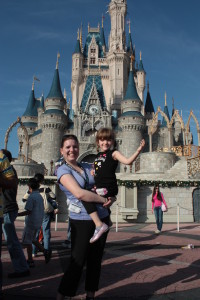
Christmas 2012 at the so-called Magic Kingdom.
Desperation is a curious thing. It makes you act out of character, leap the bounds of reason, and throw yourself, sometimes, into downright painful situations—like Disney World at Christmas, for example.
I make no secret of my abhorrence of all things Disney, from its theme parks to its silly princess movies (though I give some exception to its more recent princesses of Frozen and Brave fame because the heroines had the chutzpah–thank God, finally–to rescue themselves instead of waiting for aid from men and mice).
In fact, I loathe Disney so much that when I watched Saving Mr. Banks, I was probably the only viewer of the film who wished P.L. Travers had NOT succumbed to the Disney spell and given the world Mary Poppins on the big screen.
But I digress…sort of….
Four years ago, I took my then five-year-old daughter to Orlando over the holiday for the sole purpose of escaping Christmas. Or rather, escaping the sadly “un-Rockwellian” and dysfunctional sort of Christmas that has become the norm in my familial experience.
Don’t get me wrong. I am no Mr. Scrooge.
Okay, maybe I am….
There was a time when I, like the young Scrooge, loved Christmas. I could not get enough of it. I wanted to go to every light show, ride around in the backseat of my parents’ car and watch gaudy, neon yard displays, and wrap gifts with the kind of gusto that inspired me to create custom bows for every package and plow through double-stick tape as if it was the elixir of the Gods.
That was when I was too young to fully appreciate the steely silences at grown-up dinner tables where half the adults didn’t speak to one another. That was before I understood that marriage and children did not constitute happily ever after, and also before I realized you don’t have to give misery your company.
But enlightenment comes to most of us eventually. And when it came to me, I started to find I didn’t like Christmas anymore. I didn’t like the guilt trips that accompanied it, the expectations, the busyness of it all, the obligations, the proximity to unhappy and disappointed relatives, the spending time with people I really didn’t want to spend time with….

The best Thanksgiving ever…in Venice, Italy.
And so I went to Disney World, and, over the years and over many other family-oriented holidays, to many other places ranging from Venice to Budapest. And if I can’t find a way to get out of the state or the country for whatever pesky family holiday is trying to turn me bipolar, I will lock myself in my house with a bowl of homemade Swedish meatballs, binge-watch Netflix, and refuse to answer the phone.
In fact, I’ve made quite a habit of running away from Christmas, and Thanksgiving, and Easter, and Independence Day, and New Year’s…. You name the holiday, and I’ll tell you where I’ve gone to get away from it.
Because it’s pretty hard to feel “Christmassy” when it’s 80 degrees and you’re sitting poolside sipping a cocktail.
This most recent Christmas, I had dinner with people I’d met only days earlier, drank far too much wine, laughed till my sides ached, and happily forgot it was the 25th of December at all. And when polled, everyone at this table in Vienna, Austria, had similar stories–they were running away from home, too–from 20 years of cooking holiday dinners for ungrateful relatives, from houses empty of children or grandchildren, from piles of wrapping paper discarded from toys and gadgets forgotten within days….
Spending Christmas with these strangers was bliss, and it made me realize something–I have a problem, and, even worse, it’s not really one I want to eliminate.
I’m addicted to escapism. And not the kind of escapism that comes in a glass bottle and is topped off with a maraschino cherry.
I’m a literal escape addict.
And I don’t limit it to holidays. It’s even infiltrated my professional life. If there’s an assignment with an opportunity to get me out of Dodge, I’m always game, even if it means sitting on the ocean floor in a wetsuit with an electric eel circling me or sticking my camera lens up against the nose of a brown bear.
I realize there are those among my friends and acquaintances who just presume I love to travel, that I’m a classic Type T with a scary bit of A mixed in, and that I’m brave, lucky, a go-getter, and all that shit.
Maybe….

Christmas night with my daughter at an opera house in Vienna, Austria.
But I’m increasingly suspicious that all my running around the planet, hopping into kayaks and climbing Medieval towers is more about getting out of my life than into it.
It’s a coping strategy, not so terribly far removed from alcoholism, drug addiction, sex addiction, gambling…you name it.
Once I started to realize this, I wondered if maybe I shouldn’t just take up smoking or some similarly less expensive survival mechanism.
But then comes the self-justifying—all of you addicts out there know how this works, right?
Life is hard. (And believe me when I read those words on the first page of Scott Peck’s The Road Less Travelled, I almost didn’t want to read any more of it because I didn’t want to know that I already knew the answer—that life was hard and that I was just going to have to learn how to “keep on keeping on,” as my dad always says.)
I decided that if life was going to be hard and was going to keep throwing me curve balls, the least I could do was come up with a coping strategy (i.e. addiction) that might have some useful side effects.
Rather than suffer the hangovers and increasing tendency to do nothing that comes of addictions like sipping whiskey every night in front of the TV or endlessly trawling Facebook for some distraction from my personal reality, I thought perhaps an addiction to adventure, to travel might teach me a few things, that I might increase my knowledge, grow my curiosity, step up my courage…at the very least, become a more interesting person.
Because the only thing worse than an addict is a boring addict, right?
In the interest of continued self-justification, I’m going to say RIGHT.
Because there are a lot of ways to “keep on keeping on.” You can stop by that little country store every day after work and get a pack of cigarettes and six-pack of beer to stem your frustration and unwind from a reality that doesn’t fit that vision of life you maybe had long ago. That is indeed one way of coping, and it will likely get you through till your appointed end. As will chasing the jackpot, chasing women, chasing some pills with a shot of tequila….
But heck, wouldn’t you like to escape with a little more bang, a little more pizazz, a little more life?
I would…and I’m hoping that somewhere along this journey of running away to everywhere I may find an answer that will keep me home for Christmas one day. And if I don’t find that, I will at least find, I think, more understanding, more tolerance, and more reason to keep on keeping on….
Posted by Deborah Huso on Sep 18, 2016 in
Musings,
Success Guide My maternal grandmother was born in 1922. A Midwestern farm girl, she lived through the Great Depression and World War II. She was part of that revered group known as “the greatest generation.” She married at 18, had my mother two years later, then my uncle.
She could whip together a massive and tasty meal for a group of farmhands while my curly-haired uncle sat nearby in his highchair and my mother clung to her leg. She baked bread while her family slept, could drive a tractor, worked in a lawnmower factory many years alongside her husband, then came home in the evenings to work the farm, trying to pull together the money to send their two children to college—quite the dream for a woman who was the first in her Norwegian-American family to graduate high school.
She took life by the horns, but, in “greatest generation” fashion, she did it with grace. Too poor to buy suits from a department store, she made her own clothes, modeling her Sunday attire on the suits she saw Jackie Kennedy wearing on TV. She paired them with white gloves, high heels, and pillbox hats set atop her dark red curls. She had steely blue eyes, but she rarely smiled—she was ashamed of her less than perfect teeth.
My dad (her son-in-law) remembers her as a force to be reckoned with—one who would turn heads the moment she entered the high school theater to watch her daughter in a play. Never mind that she worked hard and had rough hands. She radiated an aura of dignity and strength.
She wore high heels to church on Sunday until she was nearly 90. She put on pretty blouses, jewelry, and lipstick to go to the grocery store.
She was… is…my model of what a woman should be—resilient, courageous, and willing to do what needs to be done.
Her husband, my grandfather, like her, was not perfect. But he aspired to great things; he was ambitious and entrepreneurial. Some said he had the best farmland in Cottonwood County, Minnesota, and he worked hard, played hard, was as stubborn as he was small and skinny. He was a voracious reader—in the attic of my grandparent’s house are boxes and boxes of his books, mostly history. Saturdays would find him playing baseball—lanky and quick, he could run like the wind. He lived on strong coffee and Lucky Strikes, adored his four granddaughters, wanted them all to have red hair just like his wife, paid off his farm before he died—young, at age 63.
Seven miles north of my maternal grandparents’ farm, my dad’s parents lived. My paternal grandfather, only a second generation American, was president of the local bank and a member of the schoolboard. He wore suits to work every day, accompanied by a fashionable hat, which he removed whenever he entered a building. He was distant but carried within him a deep desire to do good, to change his little corner of the world. When local farmers couldn’t qualify for loans at the bank he oversaw, he provided them “character” loans out of his own pocket.
These were the potent models of my youth—their strength of character emblazoned on my memory….
I remember reading a book in college by Michael C. C. Adams, The Best War Ever, in which, to a degree, he debunked the American myth of World War II as a time of prosperity, equality, and national unity. But he couldn’t debunk the greatest generation. There was no undoing the fact that the cultural norm (or at least aspiration) of that period included a phenomenal sense of doing the right thing (even if history would prove it wasn’t always right), being a man (or woman) of character, eschewing the self-absorption so common to our modern world, and giving one’s all.
I was at a conference this last week in Berkeley, California, where life is a bit more lax than in the East. In my typical nod to the manner of conduct my grandmother taught me, I dressed in a suit and heels. Always, she advised me, one’s dress should reflect how one feels about what one is doing or whom one is with. (Perhaps I owe to her my discontent with a man who wears flip-flops and shorts to dinner.)
Let’s just say I was severely outnumbered by much more careless attire at this Pacific Coast event, and one of the conference attendees even came over to me and said, a bit snippily, “So I guess you are one of those women who can do everything and can do it in heels!”
A little miffed, I replied, “Well, yes, this is how I roll.”
And, to a large degree it is. Because I can’t really get the “greatest generation” out of my soul. Or maybe it’s ancestor guilt—being the great-granddaughter of Scandinavian immigrants who came to the U.S. with little but were soon landowners, had banker sons, doctor grandchildren.
Be better.
Lift the next generation a little higher.
Recognize your individual responsibility. Don’t blame others for your failures.
Be honest about who you are and what you stand for.
Know how to take care of yourself and your family.
Don’t be pitiful. Don’t whine.
Care about the welfare of your friends and neighbors.
Do good.
Don’t pretend. Actually be the person you envision in your soul.
I won’t claim my grandparents were infallible. By today’s standards, many of the greatest generation’s cultural norms would be considered downright dysfunctional—like staying in an abusive marriage, hiding one’s pain from family and friends, maintaining stoicism (and stubbornness) in the face of trouble or the revelation of personal fault.
I am a student of history, and I look at my grandparents’ generation through the lens of history, through the cultural standards of their time.
My maternal grandmother met my grandfather at a dance. Those were the days when, unless you were Baptist, knowing how to dance was a social requirement. I am sure she danced backwards beautifully in heels. Because that was just how she rolled….
Finding women and men of that ilk today is no small feat, and grace is a largely lost art. Grace of conduct, grace of soul.
Back to Berkeley: When I sidled up to the bar at the hotel where I was staying, I was soon joined by a man to my left, who asked, “Is this seat taken?”
“No,” I replied. “Help yourself.”
Given his camaraderie with the bar and restaurant staff, I knew he must be a local and began asking him about the restaurant scene. He obliged, all the while wearing a baseball cap…indoors…when it would have taken half a second to remove it.
These are the things my grandparents taught me to notice, and my mother contends it has all made me a very fussy woman who is overly selective in her intimate friends and romantic interests.
Perhaps.
But, if the greatest generation has taught me anything, it has taught me to hold myself (as well as others) to high standards and to aspire to and inspire in others a striving toward what the Buddhists call Nirvana but which is merely learning to feel divinity and exercise grace regardless of one’s outside circumstances.
I prefer to call it skill in dancing backwards in high heels.
Posted by Deborah Huso on Jun 6, 2016 in
Musings,
Relationships “Grief can destroy you—or focus you.” –Dean Koontz
I was never a Girl Scout.

Portrait of “Daisy” at her home in Savannah
So I don’t know what the average Girl Scout learns about the founder of this more than century-old organization that evolved alongside women’s suffrage.
I just know I found myself standing in a little bit of awe when I learned on a trip to Savannah not so many years ago that “Daisy,” as Juliette Gordon Lowe was fondly known, had founded this organization that today has nearly 3 million members, out of a broken heart.
Betrayed by the man she believed to be her one true love, plagued ironically by deafness due to an accident on her wedding, and then broken by her husband’s early death and a last will and testament that endeavored to leave his estate to his lover rather than his wife, Daisy traveled the world for a time, something of an early 20th century Elizabeth Gilbert, had a chance meeting with the founder of the Boy Scouts of America, and set out to found a similar organization for young women to promote self-reliance and self-esteem.
Out of her mourning, she built a movement, using her deafness to “pretend not to hear” the voices of naysayers.
Lowe is hardly an anomaly. The world is rich with stories of mothers, fathers, husbands, and wives who have had hearts broken by tragedy, death, deceit, terminal illness, conflict, and plague and have risen to become activists for change—to give purpose to their pain.
Frankly, however, the vast majority of us run from it, letting it, as Dean Koontz suggests, “destroy” rather than “focus” us. We numb, we block out, we shut down, and often we resolve to never give access to vulnerability again.
Doing so, frankly, goes against nature. When children lose something they love, they wail, they pound their fists, they feel, and then, strangely at times, they are fine again, all the pain released, equanimity returned.
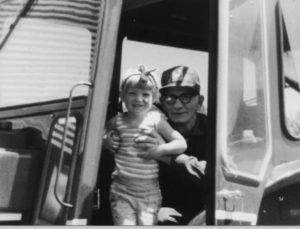
With Grandpa the summer before he died
I remember when, at just under six years of age, I experienced the death of my maternal grandfather—a skinny, relentless smoker who moved as lithely and quickly as a fox, talked fast, lived large, and pulled me into his lap when he had his afternoon coffee, sending curls of smoke before my eyes as he fed me cookies and termed me his “little cocklebur.” I adored him with the fullness of my soul.
And then he died of a heart attack, and I never got to say good-by.
In the stiff Scandinavian way of my family, there was not much in the way of tears the night of his wake. I had been taught from a young age to eschew any displays of emotion. But as the evening of convening around his casket wore on and the night grew long, my great aunt and uncle gathered me and my three cousins into their car to take us home while the rest of the adults stayed behind.
Sitting like sad little sardines in the back seat of Great Uncle Ross’ car, the four of us girls were quiet until my youngest cousin, Chrissy, began to wail. As clearly as if it was yesterday, I hear my own little voice rising into the darkness: “Why is Chrissy crying?”
And then soon, the whole backseat was a flood of tears, all four of us girls weeping for the man who had hiked us onto his shoulders, given us rides in the combine, and settled onto the floor with us to put together doll carriages and Lincoln logs. The release….
By the time we arrived back at my grandparents’ house, we had settled into a state of tentative calm, playing Barbies on the living room floor.
That night was not the last time I cried for my grandfather. Sometimes I will cry for him to this day.
What I learned that night so many long years ago, however, yet forgot in young adulthood, and had to learn all over again, was that grief is not a thing to fight.
Fighting it only pushes it forward another day, and then another, until soon, you’ll find yourself years after the fact still a mess of only subtly covered bones, and fear, and regret, prone to stupid decisions, denial, and sometimes…resistance…to ever being in a place where grief could possibly take hold.
Trust me. I have done it. And lived to tell the tale of what it is like to be so cut off from feeling that not only did I feel no pain but felt no joy, cared not if the house fell apart all around me or if laundry was piled to the ceiling. That coveted nothingness…that is really nothing to covet.
My grandfather has been gone more than 35 years. Since then, I’ve experienced loss, abandonment, rejection on a far grander scale. I’ve buried dreams, given up the love of my life, and known alienation from those who perhaps should have held me closest to their hearts. I have lived through feelings I never imagined I could live through. And when I dug in, faced it all head on, “embracing the suck,” as they say, instead of burrowing into blankness, life acquired a kind of richness that I think Juliette Gordon Lowe must have seen.
The world looked kind of like the glistening mirror of green and blue you’ll see after rising out of a dark cave or the sharpness of putting on a pair of glasses in the morning light. And there it was–gratitude for what remained–old friends, new love, the innocent laughter of children.
Most of us will never turn our pain into culture- or world-changing movements, but we can use it to change ourselves—to love and nurture what is before us for as long as we may enjoy it, to give space to our passions, and kindness to our vulnerabilities–to take the knife of suffering and part the sea to find dry land.
Posted by Deborah Huso on May 17, 2016 in
Musings,
Relationships,
Success Guide “No one saves us but ourselves. No one can and no one may. We ourselves must walk the path.”
― Gautama Buddha
It’s a primal fear—being alone.
 There are good reasons for this. Belonging means survival. Not just in nature. Even in civilized life. It’s such a deep, primal fear that many of us choose being miserable in a group, in a relationship, in a family, merely to avoid that dark chasm known as being alone.
There are good reasons for this. Belonging means survival. Not just in nature. Even in civilized life. It’s such a deep, primal fear that many of us choose being miserable in a group, in a relationship, in a family, merely to avoid that dark chasm known as being alone.
But is it really so bad?
Some might argue I come to this “alone” business from a decidedly prejudiced angle. After all, I grew up an only child in a rural community 30 miles away from my closest friend. It wasn’t like I could run down the street to find someone with whom to play. My parents both worked, often long hours. I learned, from very young, to be comfortable spending time unto myself. As I grew older, there were plenty of times I preferred it even. After all, a 24-year-old single woman does not move to the least populated and most isolated county in Virginia because she is fond of lots of regular company.
But here’s the thing: I actually didn’t learn to be alone until quite recently.
Because learning to be alone isn’t about being able to pay the bills all by yourself, taking care of a household, a farm, a child, whatever it is one has to do in life…all by yourself. No….
It’s about being enough, as you are, where you are, whether you’re with someone or not.
And frankly, most of us are not very good at this.
Sometimes we say it’s because we just don’t have time to be alone with ourselves. That requires some self-knowledge and some self-nurturing, you know. And I get it. There have been times in my life where the most self-nurturing I could muster was locking the bathroom door, so a toddler and a dog wouldn’t stand there staring at me as I sat on the commode. And the most self-knowledge I had was doing something stupid, like walking down the aisle, with the knowledge it was stupid…but doing it anyway.
And when you fail to know yourself and nurture yourself, strangely, you have a tendency to want others to fill the gap, the void, the big empty room in your mind.
The result of that you have likely witnessed if not experienced yourself:
The couple that marries, well, because everyone else is doing it, and they don’t want to be left out.
The guy that tries to start a relationship with a new girlfriend before he ends the one with the girlfriend he’s got because he’s scared of that empty space of “having no one.”
The woman who stays in a miserable marriage because she’s scared she can’t handle life “alone.”
The person who hangs out with people she’s really not all that fond of or doesn’t relate to just because it’s less scary than sitting at home by herself on a Saturday night.
The man who spends every evening glued to the television or maybe the iPad because he doesn’t really feel connected to his wife but can’t bear sitting alone with his “loneliness.”
The woman who hops from one relationship to the next, failure after failure, because the idea of being alone terrifies her, even though she knows (perhaps) that being alone might just stop the painful cycle….
I exercise no judgment on the above. Who has not done these things or things very like them?
Heck, it wasn’t so long ago that I was dating, ultimately (when I really decided to think about it), because it seemed like a divorced, relatively young, intelligent, not terribly bad-looking woman should be dating, not sitting home alone.
And then one day it just kind of hit me that dating was mentally exhausting me, not enriching me. I’d cringe when I’d hear the bleep of a text or the ringing of my cell phone. I’d respond out of obligation, not desire. I’d sit across a dinner table smiling brightly because I was polite and gracious, not because I was actually happy to be there. I’d wince at the thought of another kiss from a middle-aged man who ought to be better at this stuff after three or four supposed decades of practice….
I found myself longing for my girl and guy friends, my daughter, a quiet night alone with a book and a glass of wine or cup of tea. I craved the nurturance of the people who already knew and loved me, not strangers. And sometimes, I just craved taking a nap alone in the sunshine.
I discovered I was enough, that my life was enough, that those I already loved were enough, and that everything was full, and rich, and good, whether I was sitting home alone in front of the fire, cloud watching with my daughter on a picnic blanket, or pulled up to a dinner table with my most intimate friends.
Likely, at some point in your life, you have heard a friend or acquaintance say something like “It was only once I became comfortable with being alone that I met the love of my life.” This is not some hokey adage that says love will only come to you when you stop looking. No. It’s really about being comfortable in your own skin and, by extension, enabling others to feel comfortable in theirs.
That is the careful art of being alone. When you relish your own company and generate your own joy, others will not only be drawn to your seemingly easy bliss, they may even begin to emulate it.
Posted by Deborah Huso on Mar 22, 2016 in
Musings,
Success Guide,
Travel Archives “Life begins at the end of your comfort zone.” –Neale Donald Walsch

The weekend I learned archery AND how not to fall out of an ATV while driving sideways down a creekbed.
There was a time when piano recitals were one of the most dreaded things in my life.
I hated them, hated everything about them. First of all, preparation for them involved learning the most difficult composition of the year—some piece of classical music designed to show off all I had learned through 50-some weeks of lessons. And it was rarely a song I enjoyed playing…in no small part because I didn’t enjoy playing things that didn’t come easily.
Kind of the way I didn’t like Calculus. Or physics. Or football.
None of it came easily, you see.
And my parents, teachers, and coaches were so good at noticing all the things I did well that they really didn’t worry themselves about the areas where I struggled and then, usually, quit. Like piano. My mom said if I really hated piano lessons, I could stop when I turned 13, and I did.
In retrospect, it was one of a host of stupid decisions I made in my life out of laziness, boredom, self-consciousness, and an unwillingness to expose myself to the possibility of failure. Today I sit down at my piano and stare longingly at sheet music I wish I had the depth of skill to play.
Looking back, I can easily say I have lived more than half my life in fear.
Fear of how stupid I might look in trying something new.
Fear of being judged.
Fear of being ridiculed.
Fear of not being understood.
Fear of suffering.
Fear of being alone.
Fear of being abandoned.
Fear of not being smart enough, strong enough, good enough….
Fear of being KNOWN.
I couldn’t tell you when I finally snapped out of this. I don’t believe it happened in an instant. It was a process, a long and sometimes painful one.
I just know I was hiking one of the steepest trails I’d ever hiked (yes, this was before the Grand Canyon) with a friend and his son, the uber fit youngster looking like he was out for a Sunday stroll while outpacing us by several hundred yards. My friend turned to me and asked if I needed to rest.
“Nope,” I replied, though the sweat was pouring down my temples, “I’m good.”
And he grinned a little at me and said, “You know, you’re a really good sport. You’ll do just about anything, and you don’t complain about it either.”
I’m sure I looked at him a little sideways. I’d certainly never thought of myself as a good sport even though it’s one of those phrases parents bandy about, perhaps out of some obligation they feel to at least attempt to instill values of adventurousness, courage, and comfort with struggle or failure in their children.
But when I thought about it, my friend was right. Somewhere along the way, I had indeed become a good sport. And more than that, I’d gotten pretty fearless.
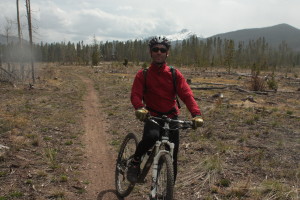
Mountain bike racer Jon Brickner: In all fairness to myself, do you see how tiny and wiry this guy is??
Sitting in a front row pew at church, anxiously waiting my turn to race through my dreaded recital piece on a clunky church piano as quickly as possible, I’m pretty sure I never dreamed in a million years I’d have the chutzpah to go mountain biking with one of the nation’s top racers (and yeah, it almost killed me) or to sit on the ocean floor, removing and replacing my dive mask at 60 ft. below the surface without launching into a full panic (and yes, I laid awake the entire previous night with anxiety about it).
I also never imagined I could love so deeply and be battered so wickedly and have the guts to go in for another round, and another. Or that I would be the kind of person who could pick up stakes and move every couple years, switch jobs every few months, and then finally throw up my hands and go out on my own without the slightest idea if I could really make it work. And I still haven’t proved if I can….
Somewhere along the way, I’d started trying to be like the famous Crazy Nastyass Honey Badger. I just did not give a shit.
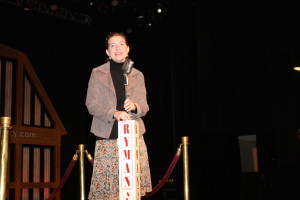
Heck yeah, I sang a few lines of “Crazy” at the Ryman!
I did not care if friends or relatives thought I had lost my mind. I did not care if it was dangerous to walk the streets of South American cities alone. I did not care if a piranha might eat my arm off. I did not care if I toppled off my standup paddleboard into the freezing Tennessee River. I did not care if anyone else was watching me dance or hearing me sing. I was learning to push my own envelope and in the process learning that it was outside my comfort zone that real life begins.
While you’ve undoubtedly watched the viral honey badger YouTube video and snorted laughter, how deeply have you considered the honey badger’s philosophy on life? Yeah, I’m being serious. Don’t forget that National Geographic has called the critter “the most fearless animal on the planet.” It will do, chase, eat anything.
And while it’s doing all this wild living, scavenging birds and foxes follow it around, too lazy (suggests the narrator) to go fight for their own meals, waiting to get the leftovers from this badass rodent. “The honey badger does all the work while the other animals just pick up the scraps,” notes the narrator.
I start thinking about these scraps. And people I know who survive on them. Getting by. Marking time. Watching life from a safe distance. Going in only when they’re absolutely certain the coast is clear.
And, of course, when you wait too long, curry safety over experience and security over destiny, scraps are what you will get.
If you ever thought “being a good sport” was about “settling,” reconsider. It’s really about getting out there, being willing to go for the biggest prize, and being able to feel good about yourself even when you don’t land it…because you know you tried, you know you lived, you know you pushed through fear.
What’s pushing through fear worth? Well, you certainly aren’t going to know until you’ve done it. But I will say the other side of fear is pretty euphoric…and worth giving a try.
A close girlfriend of mine once said to me, “You’re the bravest female friend I have who isn’t a lesbian.”
Well, she didn’t call me the “honey badger.” But close enough. I’ll take it.
Posted by Deborah Huso on Feb 28, 2016 in
Girlfriends,
Musings,
Travel Archives “Beauty is truth, truth beauty. That is all ye know on earth, and all ye need to know.”
–John Keats, “Ode on a Grecian Urn”

Who doesn’t look hot sporting an oxygen tank and a buoyancy control device?
They are among the most recognizable lines in English literature—taught in every twelfth grade English class, recited with little cognizance by millions of students, and something of a mystery even to scholars. Just what did John Keats mean?
And lest you think this blog has devolved into the realm of the esoteric, let me remark that it was just days ago I started to really get these lines supposedly spoken by Keats’ Grecian urn: “Beauty is truth, truth beauty.”
It hit me when I was gazing at the cover of Sports Illustrated’s latest swimsuit issue with so-called “plus size” model Ashley Graham crawling toward the camera in an alluring pose on the beach. When Cheryl Tiegs tweeted that Graham was a poor role model because of her weight, public outrage (at Tiegs) was instantaneous.
As it should have been.
Because beauty isn’t just in the eye of the beholder; it’s also a lot deeper and more complicated than a dress size…or even a pretty face. Like truth, it’s multi-faceted, complex, open to interpretation, and rarely absolute. And it’s also way more than skin deep.
But I can say all these things until I’m blue in the face, and it won’t keep the vast majority of American women (and girls, too) from looking at themselves in the mirror and launching into a litany of self- criticism:
My nose is too big.
My breasts are too small.
My hips are too wide.
My feet are too big.
I’m too short.
I’m too tall.
I look fat.
I hate my muffin top.
Ugh, look at that back fat.
I need to go on a diet.
And on and on it goes. I’ll admit it. I’ve done it, too. After all, in the 40 years I’ve been alive, the ideal woman, physically speaking, has been tall and waif-like (except for the breasts—the breasts remain Barbie-doll size; and I’m talking Barbie from the 1980s, not the C-cup version of modern times). In short, she has been, well, freakish.
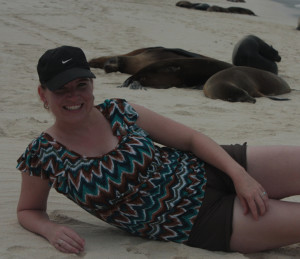
Now here’s my idea of a cover shot; the chunky gals in the back are Galapagos sea lions….
But I have, like most other women, nevertheless longed, at times, to exist a little closer to that ideal, even though I was, fortunately, raised by parents who never put a lot of stock in popular notions of beauty. In fact, I don’t think they could have cared less what I looked like. I was raised to place value in intelligence, hard work, good character, and, thanks to my dreamer father, risk-taking and adventure-seeking.
This is not to say I have been immune to the desire to look tantalizingly beautiful. Heck, I admit it, I put on mascara and lipstick to go to the gym. Nevermind that I’m wearing yoga pants and a tank top. I am determined to put myself a step above the Walmart variety woman running around in her flannel PJ bottoms and crocks with socks that don’t match. (Though there is something in me that admires her “fuck it, I just came here to get Doritoes and a box of wine” attitude….)
I do take a little pride in the fact that I stop at lipstick when it comes to gym and grocery store runs. There’s a limit to the absurdity of obsession with appearance in which I will engage. I know women who will do their 20-minute makeup routine before starting a workout that’s going to sweat it all off within 10 minutes. I also know women who primp in front of the mirror, trying on one outfit after another, redoing their hair half a dozen times, wasting precious hours of their lives in an effort to be stunning every single day, physically stunning at least.
And these are not women who have nothing else to offer the world. They are wildly intelligent, witty, successful, worldly. Why the hell are they standing in front of a mirror in Rome fussing with their flat iron instead of just putting a hat over the bad hair day and exploring the perhaps once-in-a-lifetime world on the streets outside?
I think it’s because they don’t really understand what beauty is. Someone somewhere has taught them to define themselves by their face, their breasts, the curve of their hips, the shape of their legs in three-inch heels. Meanwhile I’m lying on a beach with stinky sea lions in the Galapagos or squeezing my body into the most unflattering wetsuit ever and turning my feet into fins. (If you want to test the depth of your self-confidence, put on a snorkel mask and stuff a regulator in your mouth, and let someone take a picture of you.)
A gentleman I dated recently asked me why I was so committed to exercise. “Do you have a goal you’re trying to reach?” he asked. I’m sure he expected me to say something like I wanted to lose 15 pounds, or I wanted to be able to bench press a sofa. But I replied, not the least bit tongue in cheek, “I exercise because I don’t want to deprive myself of wine and cheese and because I still want to be able to hike the Grand Canyon when I’m 80.”
Beauty is truth.
Do you get it yet?
If you’re running five miles at 5 a.m. every morning, and your sole motivation is that you believe in the depths of your soul that your ass is the size of a picnic table, then it’s time for a reality check. If you’re running at 5 a.m. every morning, I don’t care what size your ass is, you’re awesome. You’re strong. You’re motivated. You’re beautiful.

In Puerto Rico with the next generation of beautiful women.
Rest assured, this wasn’t something that came to me overnight. I’ve spent plenty of time lamenting the fact that my eyes aren’t as lovely as Elizabeth Taylor’s or that my rear isn’t as shapely as J-Lo’s. But chances are good, I won’t be lamenting it while teaching my daughter how to ride a bike, while kayaking on a glacial lake, or while sharing cocktails with my best girlfriends on a Friday night.
I find my beauty in strength, courage, and aliveness.
Where do you find yours?
Because if you can’t wipe off the eye shadow and the lipstick, pull off the flattering cocktail dress, the beautiful heels, let down that perfect hair, and stand in front of your bedroom mirror in all the nakedness of your body and soul and feel beautiful, then it’s time to start being kinder to yourself.
No one’s asking you to crawl on a beach in a bikini while photographers take pictures of you and plaster them all over the covers of magazines. In fact, no one’s asking you to do anything…other than be you.
And it’s in that critical truth—your own naked authenticity—that you’ll find your beauty.
Posted by Deborah Huso on Oct 22, 2015 in
Men,
Relationships Perhaps this will seem an odd subject matter for a divorced woman who has failed to turn at least three non-married, long-term relationships into marriage; nevermind all the two- and three-month dating scenarios that ultimately went nowhere…or the first dates that made me want to run into the restroom and try and crawl out of a window…(and yeah, I actually know a man who did this on a first date with a woman; he is now happily married to a dear friend of mine).
But given my experience with “endings,” I’d say there is no one more qualified to comment on what makes the “honeymoon” phase of a romantic relationship die. I am an expert in relationship death. In fact, more often than not, I’ve been the one calling for the coffin lid to close. (There is, after all, nothing more grotesque than an open coffin following death by train wreck.)
After 24 years of romantic interaction with the opposite sex (yes, folks, I have thus far bucked the current trend of changing my gender and/or sexual orientation for the sake of publicity), I actually do know a few things about what inspires romantic attachment in the first place and why even the best of relationships frequently die.
It’s all about expectation.
A friend of mine said his latest divorce occurred when his wife proclaimed their marriage “wasn’t fun anymore.”
News flash: love isn’t fun.
In fact, it can be downright painful at times. What’s the best way to avoid pain? Avoid vulnerability, of course. But if you avoid vulnerability, you will also avoid love…the kind of love that lasts anyway.
So plenty of us try to avoid vulnerability (and the potential for pain) altogether by settling into the traditional American marriage stalemate: Okay, so we’re married, and damn it, we’re going to stay married, even if it means we have sex only twice a year and relish every waking moment we don’t have to be anywhere near each other. Let’s suck it up and survive…for the kids.
Trust me, I’ve been there.
I’ve also been in the fuck this relationship crap—I’m done with men (or women) phase where I feel like life would be a whole lot easier without romance. And yes, it would be. But easy gets, well, boring. I’ve never been able to successfully replace a good-looking, intelligent man with a Manhattan or a gin and tonic.
So what’s the secret? How do you get love to last past the proverbial “honeymoon phase?”
You’re probably not going to like the answer. Because it’s be yourself. Be yourself in all your annoying, beautiful, vulnerable, terrifying, hopeless, wonderful, imperfect way.
Sure, authenticity has become the buzz word of content marketers everywhere, but there’s a reason for that. Nothing beats it. If you want your marriage to last past the honeymoon in Aruba or you want your romance to transcend those first few months of furious sex and exhilarating uncertainty, then you’ve got to be real.
Women tend to be a lot better at this authenticity thing than guys. Most of us grow up sharing secrets with one another, crying in each other’s arms, calling on one another for help in times of need. But plenty of us will lock all that stuff up when it comes to the guys in our lives. We’ve heard all the horror stories—men run from women who cry, share their problems, or show interest in anything other than sex. So, more often than not, we’ll be just as locked up and cut off as the man we’re trying to woo or who is trying to woo us.
The excitement of new love will carry a relationship like that for awhile…but eventually you’ve got nothing. There’s nothing more to talk about without getting into why you hate your mother or why he finds it hard to say “I love you.” So you’re bored, frustrated, and empty…. You break up. Or…if you foolishly got married before you hit that phase, you enter into a grumpy truce to stick it out as long as you can stand it.
Once upon a time, I got uber brave with a man, decided I had nothing to lose and determined to be my authentic self. I cried in front of him when I was sad. I told him my core fears. I admitted I suffered from anxiety. I told him I loved him, and I said it first. And then something started to happen. He started doing the same. He admitted all the guilt he suffered in his life, the way his mother had unintentionally shut down his soul, the fact that he had never really believed in love and thought the sonnets of Shakespeare and Neruda were BS…until he met me.
And let me tell you. The sparks in that relationship kept on flying…for years. There was no end to what we could talk about, no end to the learning we acquired from one another. In fact, had circumstances beyond my control not tragically intervened, we might easily have kept that honeymoon phase going till death.
That’s how I know there is love beyond the butterflies. And if you feel some of your truest bliss when your arms are wrapped around the woman you married, then you may be one of the fortunate few who learned the secret to making “in love” last.
And if you’ve never felt that kind of deep safety and joy with another human being…and you want it, then you might have to consider unbuttoning your soul a little bit and setting the example for the one you love to do the same. The glue that binds two people together isn’t love per se; it’s emotional intimacy. And the only way to have it is to be brave…before the honeymoon is over.







 There are good reasons for this. Belonging means survival. Not just in nature. Even in civilized life. It’s such a deep, primal fear that many of us choose being miserable in a group, in a relationship, in a family, merely to avoid that dark chasm known as being alone.
There are good reasons for this. Belonging means survival. Not just in nature. Even in civilized life. It’s such a deep, primal fear that many of us choose being miserable in a group, in a relationship, in a family, merely to avoid that dark chasm known as being alone. 




